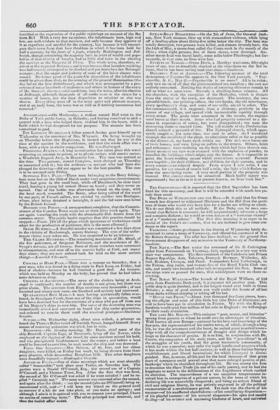CHOLERA IN HYDE PAItK.—There was a rumour on Saturday, that
a poor man, who was found in a dying state in Park Lane, on Friday, had died of cholera—because he had vomited a good deal. An inquest, which was held on Monday on the body, has proved that he had taken some deleterious drug. CHOLERA sa. ARCHANGEL.—The news of the cholera being at Archangel is confirmed ; the number of deaths is not given, but there was great alarm. The accounts from Riga continue very favourable ; of one hundred and ninety new cases, one hundred and seventy had recovered.
QuanANT1Nr. RUN Man.—A man having accidentally fallen overboard, in Stoodgate Creek, from one of the ships in quarantine, would have been drowned but for the exertions of a man who put off from one of his Majesty's ships to save him. The saver of the drowning man was immediately seized and conveyed on board the ship under quarantine, and ordered to remain there until she received pratiques--Maidstone Gazette.
Stamm—On Wednesday night, about nine o'clock, a prisoner on board the Thames Police vessel off Norfolk Street, hanged himself. Every means of restoring animation was tried, but in vain.
DROWNING —On Monday morning, Mr. Davis, chief mate of the ship Benwell, Captain Ingo, of Newcastle, lying off the Tower, while employed on the rigging Of the vessel, by some accident missed his hold, and was precipitated head-foremost into the water ; and before a boat could be lowered to save him, he sunk under the ship and was drowned. FATAL Goa Amos:ass—Mrs. Britten, of St. Ives, and her eldest daughter, were killed, on Friday last week, by being thrown from their pony phaeton, while descending Houghton Hill. Two other daughters were dreadfully injured.—Thostingdost Gazette. AFFAIR OF FOLLY.—One of those meetings which are most absurdly called" honourable," took place near Tralee, on Saturday last. The parties were a Daniel O'Connell, Esq., the second son of a Captain O'Connell, and a Thomas Trant, Esq. After the first shot was fired, the second of Mr. O'Connell was asked if he were satisfied ? and he replied " Certainly not." The same answer was returned after the second, and again after the third ; w:ien she second (also an O'Connell) being remonstrated with, said—" I will keep my friend on the ground until to-morrow if a hit do not take place, or you make an apology; and although I admit it is optional with you to remove your principal, I have no notion of. removing ,mine." The other -principal was removed, and thlwahe foolish affair ended. • . STEAM-BOAT DISAST Eu.s.—On the 7th of Jane, the General Jackson, New York steamer, blew up with tremendous violence, while lying off a landing-place about thirty-five miles below the city. The boat was totally destroyed, two persons were killed, and sixteen severely hurt. On the 14th of May, a steam-boat called the Coosa sunk in the mouth of the Ohio ; when eight persons, five of them slaves, were drowned. Another steam-boat was burnt lately, some miles below Pittsburgh ; but fortunately, in that case, no lives were lost. EFFECTS OF Tointon.—Oweit Davis, a Merthyr workman, fifty-eight years of age, was so dreadfully shocked at the riots there on the 3rd instant, that he has been raving mad ever since.— Cambrian. DREADFUL FIRE IN AMERICA.—The following account of the total destruction of Fayetteville appears in the New York journals. " Fayetteville, N. C., May 20.—Fayetteville is no more ! All is in ruins ; only two stores of all that the place contained are standing ; the rest are entirely consumed. Nothing but stacks of tottering chimneys remain to tell us what we once were. Scarcely a dwelling-house remains. All the churches, with the exception of the Methodist, which is distant from the centre of the town, are destroyed. The academy, the two splendid hotels, our printing-offices, the two banks, the old state-house, every apothecary's shop, and some of our mills, are all in ashes. The fire communicated, it is sapposed, from a chimney, precisely in the centre of our village, and spread with inconceivable rapidity through every street. The goods were consumed in the streets, the engines were burnt at their stands. Some who had property removed to a distance in expectation of safety, but were disappointed ; too soon the destroying element reached them. The tall steeple of the Presbyterian church seemed a pyramid of fire. The Episcopal church, which apparently caught at the same time, was soon in ashes. As I wandered through the outskirts of the place, to administer relief as far as possible to the distressed, my heart sunk within me. The sick were borne out Of their houses, and were lying on pallets in the streets. Others, faint and exhausted, were reclining on the beds which had been thrown out. Every moment our ears were stunned with the explosion of powder, to demolish the haildings which might stay the flames. It is impossible to paint the heart-rending scenes which everywhere oecurred. Parents were inquiring for their children, and children for their parents, and in every countenance reigned despair. From where I now write, I can perceive, for the extent of nearly half a mile, the light whiah flashes up from the mouldering ruins. A very small portion of the property was insured. Our distress cannot be conceived. Much bodily injury was experienced ; but so far as it is at present known, no lives were lost."
























 Previous page
Previous page